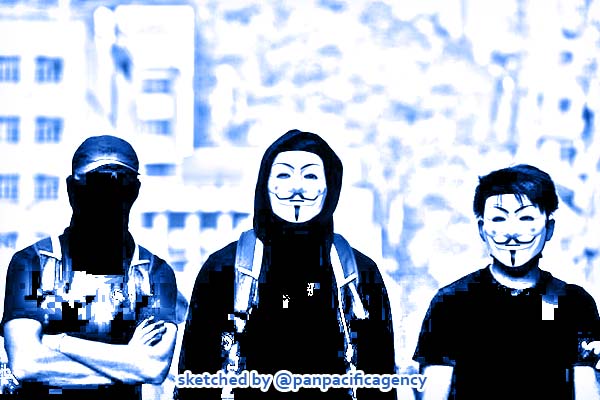Hong Kong government mulls anti-mask law, violators could face a year in jail

Anti-government protesters wearing Guy Fawkes masks and a full face mask attend a protest in Sham Shui Po district, Hong Kong on Oct 1, 2019. PHOTO: REUTERS. Sketched by the Pan Pacific Agency.
HONG KONG, Oct 4, 2019, Bloomberg, AFP. Hong Kong is expected to ban face masks for protesters on Friday (Oct 4) in a bid to quell months of violent unrest, invoking an emergency rule for the first time since the city came under Chinese control in 1997, reported The Straits Times.
Violators of the ban, which will include exemptions, could get a jail term of as much as one year or a fine of HK$25,000 (S$4,400), the South China Morning Post reported, citing people it didn’t identify.
Chief Executive Carrie Lam was expected to meet her Cabinet on Friday morning to decide whether they should enact the Emergency Regulations Ordinance to ban all face coverings.
If passed, the ban would likely be announced later in the afternoon and come into force at midnight, a government source told the South China Morning Post.
The former British colony is also studying extending the detention period of suspects beyond 48 hours, given the manpower needed to handle the large volume of protest arrests, the Oriental Daily reported.
Mr Hu Xijin, editor-in-chief of China’s Global Times newspaper backed by the Communist Party, said in a tweet that Western countries shouldn’t apply “nasty double standards” when reacting to the ban while noting that Canada and the US state of New York were reported to have similar laws.
“There’s strong demand in Hong Kong calling for anti-mask law,” Mr Hu said. “Most of the violent activities in Hong Kong were committed by masked rioters.”
The move is likely to trigger intense clashes this weekend, with protesters already calling for mass demonstrations to oppose the law.
The face mask has become a symbol of resistance among protesters who fear retribution if they are identified: China has already applied pressure to businesses such as Cathay Pacific Airways to fire employees who have participated in demonstrations.
Police fired tear gas and pepper spray at protesters in the residential area of Tai Koo on Thursday night as demonstrations erupted in 11 sites and shopping centres across the city following the reports, the SCMP said. There were also calls for a protest in the Central business district at 12.30pm on Friday.
First passed by the British government in 1922 to quell a seamen’s strike in Hong Kong’s harbour, the emergency law was last used by the colonial administration to help put down riots that rocked the trading hub in 1967.
Denounced by protest leaders as a form of martial law, it could give the government greater leeway to arrest citizens, censor publications, shut off communications networks and search premises without warrants, among other measures.
The move would come shortly after a protester was shot in violent demonstrations that once again shook the city on Tuesday, as President Xi Jinping celebrated 70 years of Communist Party rule in Beijing.
Hong Kong stocks briefly jumped on the reports in afternoon trade on Thursday, rapidly erasing an earlier decline.
Government supporters say emergency powers are needed to combat the increased violence of hardcore protesters.
But critics have countered that bypassing the legislature and giving Mrs Lam the power to make any law would be a slippery slope for an international finance hub that owes its economic success to its reputation for rule of law and judicial independence.
“This is a watershed. This is a Rubicon,” pro-democracy lawmaker Claudia Mo told AFP. “And I’m worried this could be just a starter. More draconian bans in the name of law could be lurking around the corner,” she added.
The law would be difficult to enforce, the Post reported, and could spur court challenges as a rights violation. One police inspector, who requested anonymity, told the Post that the move would stir up more trouble.
It could also fuel further international condemnation of Mrs Lam’s government.
US Senator Elizabeth Warren, a front runner for the Democratic presidential nomination, called for the United States to stand up to China in Hong Kong. She also urged America to stop exports of police gear to the city and provide temporary protected status to its residents.
“Getting China right takes more than bellicose tweets coupled with fawning summits – and more than uncoordinated and often counterproductive tariffs that burden ordinary Americans,” she wrote in a Foreign Policy magazine opinion piece outlining her plan for addressing issues in the city.